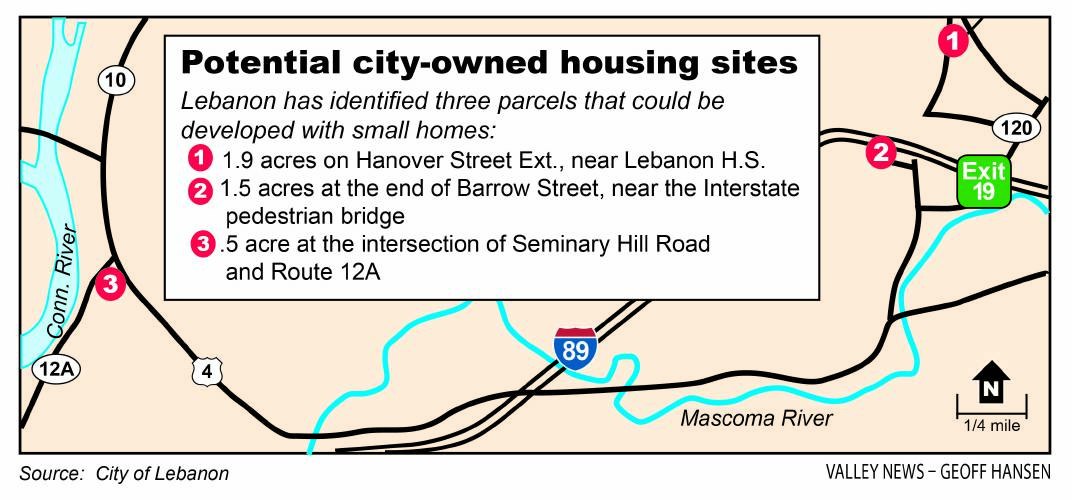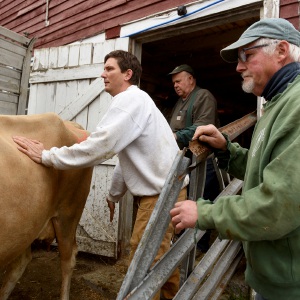Lebanon City Council to hold hearing on funds for municipal housing development

| Published: 02-20-2024 10:01 PM |
LEBANON — The city is taking the first step for plans to use $440,000 in state grant money to help fund the development of affordable homes on city-owned land for public employees.
The City Council will hold a public hearing on Wednesday to consider creating a revolving fund to support the planning and construction of “pocket neighborhoods,” or clustered groups of six to 12 homes that share an open space, on up to three city-owned properties. Possible locations include a two-parcel property at the end of Barrows Street, a 1.9-acre parcel on Hanover Street Extension and two abutting parcels at the intersection of Seminary Hill Road and Route 12A.
The council is exploring a plan proposed by city administrators in which the city works with a lender to fund the construction of a clustered housing development. Once built, these homes would be sold to buyers at affordable borrowing rates, allowing the city to recoup their investment.
The prospective buyers would be selected through a lottery system, with preference given to municipal and school district employees as well as employees of nonprofit organizations such as the Lebanon Housing Authority.
Mayor Tim McNamara said the project is also meant to demonstrate to private developers that building affordable single-family homes can be economically feasible if it provides the right resources and support.
“Our hope is that it will stimulate the interest of private developers in this type of project,” McNamara said in a phone interview on Tuesday. “We are looking to be the sourdough starter for the making of the bread.”
Despite a high demand in the Upper Valley for affordable single-family homes, few developers are willing to undertake these projects due to the lack of financial return to offset the costs — not just in money to develop housing but the time expended to get city permits.
To reduce these burdens on developers, the city is currently developing pre-approved home designs that will already meet municipal requirements, eliminating time and costs that developers incur during the permitting phase.
Article continues after...
Yesterday's Most Read Articles
 Herd departs Hartford’s last remaining dairy farm
Herd departs Hartford’s last remaining dairy farm
 At Dartmouth, hundreds protest ongoing war in Gaza and express support for academic freedom
At Dartmouth, hundreds protest ongoing war in Gaza and express support for academic freedom
 Claremont removes former police officer accused of threats from city committees
Claremont removes former police officer accused of threats from city committees
 Over Easy: ‘A breakfast without a newspaper is a horse without a saddle’
Over Easy: ‘A breakfast without a newspaper is a horse without a saddle’
McNamara said their goal is to keep the sale prices of these homes “well below market rate.” such as a 3-bedroom unit in the range of $300,000.
According to NH Realtors, the median sales price of a single-family in Lebanon was about $500,000 at the start of 2024.
The city recently received $440,000 in funds from InvestNH, a state-funded grant program intended to incentivize the development of affordable workforce housing. If approved by the City Council, the $440,000 will be transferred into a revolving fund for use as seed money in the initial design, permitting and other costs to build a housing project.
Deputy City Manager David Brooks explained at a Feb. 7 council meeting that placing the money in a revolving fund is intended to create transparency because the money may only be used toward the redevelopment of those specific properties.
“It’s the cleanest way to handle the up-front costs associated with (the project) and, ultimately, from the hoped-for sale of these (housing) units; that money would come back to it to seed the next project,” Brooks said.
Brooks said in a phone interview on Tuesday that the city will act as the primary developer of these housing projects. They will hire the architects and partner with a builder to construct the project. The city will use its own engineers during the design and planning phase.
In addition to the InvestNH grant money, the city will partner with a private lender to finance the remainder of the project.
Brooks said the city plans to sell the units directly to the prospective buyers. The homeowners would collectively own the property as well. A condominium association would likely be created to manage the costs to maintain the property.
The city is still assessing these properties to determine their feasibility to develop.
The parcel on Hanover Street Extension abuts homes on Old Etna Road. Because there are wetlands in that location, the city needs to study whether a portion of the property could be developed without having an environmental impact, Brooks told councilors last month.
The property at the end of Barrows Street, a dead-end residential lane near Interstate 89, contains two parcels totaling 1.5 acres, which could be merged by discontinuing the right-of-way that divides them, according to Brooks.
The two parcels at the intersection of Seminary Hill Road and Route 12A total a half-acre, though the available property may be reduced in the final design of the Dry Bridge project, a state-funded replacement and widening of the nearby South Main Street bridge over a railroad right-of-way. That project is scheduled to begin construction in February 2025.
Brooks said at the Feb. 7 meeting that there will be additional public hearings over the course of the project, including at the Zoning Board of Adjustment and at the City Council, which will need to authorize any sale of city-owned properties.
The public hearing will take place on Wednesday at 7 p.m. at City Hall.
Patrick Adrian may be reached at padrian@vnews.com or at 603-727-3216.


